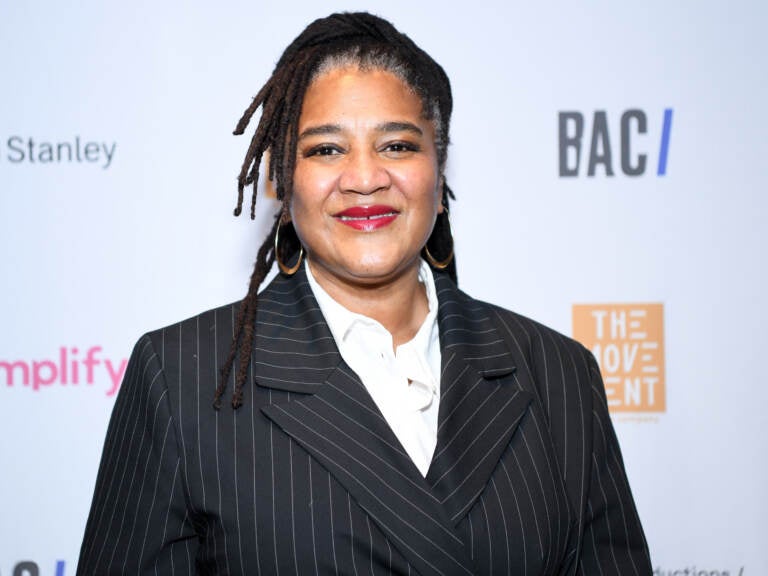Two-time Pulitzer winner Lynn Nottage’s new play is inspired by Reading, Pa.

NEW YORK, NEW YORK - DECEMBER 06: Lynn Nottage attends A Broadway Celebration at The Times Square EDITION on December 06, 2021 in New York City. (Photo by Jenny Anderson/Getty Images for CAA )
Two-time Pulitzer Prize-winning playwright Lynn Nottage has been very busy for the last few months – right now, she has both a new play and a new musical on Broadway, as well as a new opera at Lincoln Center. I sat down with Nottage last month at the Hayes Theatre, where her new comedy, Clyde’s, is being performed. She had some time to chat before going to a preview performance of MJ, the new Michael Jackson musical, for which she’s written the libretto.
“I will tell you, in all honesty, I haven’t been getting a lot of sleep,” she says laughing. “This is the dream,” she quickly adds. “The dream is to really be busy doing the thing that you love, deeply immersed in making art.”
Nottage has been living the dream since the mid-1990s, when her plays began getting produced by major theaters. Along the way, her dramas Ruined and Sweat each received the Pulitzer Prize, making her the first woman to win the category twice.
“Lynn is one of our most celebrated writers, and I think she has three major skill sets,” explains Kate Whoriskey, who directed those Pulitzer-winning plays as well as Clyde’s. “One, is she’s incredible with character, and also, she’s great with structure. And then I would say the last thing is that I think she has the ability to see into the future more than anyone I know, in terms of what the world is asking for.” And she adds that what the world needs right now is some lighthearted comedy, albeit with serious undertones.
Nottage describes Clyde’s as magical realism, and says it’s set both in the kitchen of a sandwich shop and a liminal space. All the play’s characters are formerly incarcerated, including the shop’s owner, who’s kind of the boss from hell.
Uzo Aduba, best known for her Emmy Award-winning role of Suzanne “Crazy Eyes” Warren in Orange Is the New Black, plays the devilish Clyde. She admires Nottage’s choice of topics: “She has done the very hard thing of giving space to faces, voices and stories that are often forgotten.”
When Nottage went to Reading, Penn., to research Sweat, her play about struggling blue collar workers, she also spoke with many people who were trying to resurrect their lives after leaving prison. So, while the characters in Clyde’s work a dreary, repetitive job, they dream of a better future… and a better sandwich.
Nottage says the comedy is about both mindfulness and the creative process. “A sandwich is very simple, but you can assemble it in such a way that make those flavor combinations quite complicated,” she explains. “And I like to think of that as a metaphor for what we do as artists.”
Nottage lately has expanded her portfolio as an artist, adapting her popular play Intimate Apparel into an opera with a score by Ricky Ian Gordon. Set at the turn of the last century, it’s about a Black seamstress who makes lingerie, with a clientele that includes a Fifth Avenue matron and a prostitute in the Tenderloin, while yearning for love herself. Nottage wrote the play when she found a photograph of her great grandmother, shortly after her mother died and while she was moving her grandmother to dementia care.
“I had so many questions and I realized there was no one left to answer them,” she says. “That really broke my heart. And it made me think a lot about, particularly as an African American woman, a Black woman, that so much of our history has been lost because of the reticence on the part of our relatives, and their belief that our stories weren’t important enough to document.”
Gordon recounts that for this, Nottage’s first opera, the two of them worked closely not just to boil down the intimate play to its essence, but also to open it up, so it evokes the world beyond.
“Lynn is a very deep swimmer: You don’t have to worry about whether it’s going to get there, make its point and grab you by your gizzard,” Gordon says. “And that’s the kind of writer you want to work with, because writing music is hard! And you really want to feel like if you are going to go there, you want the writer to go there.”
The final project of Nottage’s trifecta is a musical featuring the back catalog of the late superstar Michael Jackson. She says his music was her personal soundtrack. “I can track through all of my emotional life through the Michael Jackson songbook,” Nottage says, “so I was very excited to figure out a way to bring those songs to life.”
She and her collaborators decided to set the musical in the days before Jackson’s enormous 1992 Dangerous world tour, as a jumping off point for the King of Pop to reflect on his life and career. “I was interested: How does someone who is the biggest star in the world endeavor to be an even bigger star, and to create something that’s a reflection of who he is?” Nottage explains. “We talk about it as a mixtape of his life.”
The tour eventually was interrupted by Jackson’s drug addiction and the beginning of press reports alleging child abuse. While MJ: The Musical focuses on Jackson’s creative process, director/choreographer Christopher Wheeldon acknowledges the controversy surrounding its subject.
“Everyone brings their own feelings, their own thoughts about Michael into the house,” Wheeldon says. “And I think that’s one of the things that Lynn has done so successfully, is create this piece of art that allows for some breath around those viewpoints.”
While theater was on pause during the pandemic, and after George Floyd’s murder, Lynn Nottage co-signed a document called “We See You White American Theater,” demanding institutional change. Since Broadway reopened, many of the plays produced have been by Black playwrights.
Nottage is optimistic… but: “We have to not allow ourselves to go backward,” she says. “And some of that onus is on us as artists, some of the onus is on producers and people who work in the industry. But I also think some of the onus is on the audiences, because they have to come out and support us.”
And for those who want to support it, remaining performances of Clyde’s will be live-streamed throughout this weekend.
9(MDAzMzI1ODY3MDEyMzkzOTE3NjIxNDg3MQ001))




 Independence Hall in Philadelphia: Courtesy BigStock" title="Screen Shot 2017-09-27 at 3.41.13 PM" width="360" height="280"/>
Independence Hall in Philadelphia: Courtesy BigStock" title="Screen Shot 2017-09-27 at 3.41.13 PM" width="360" height="280"/>